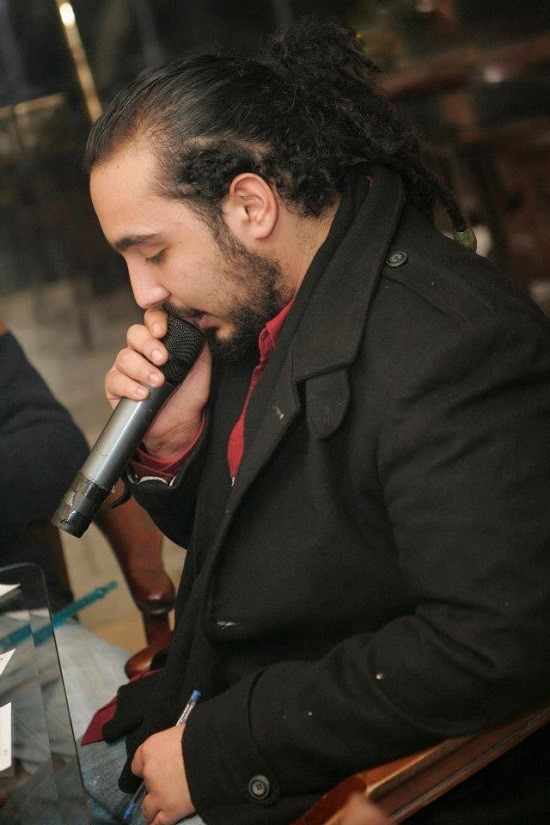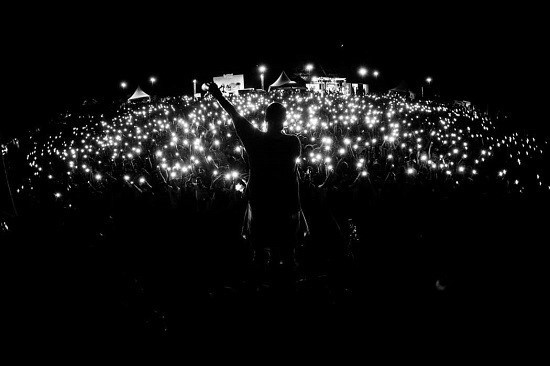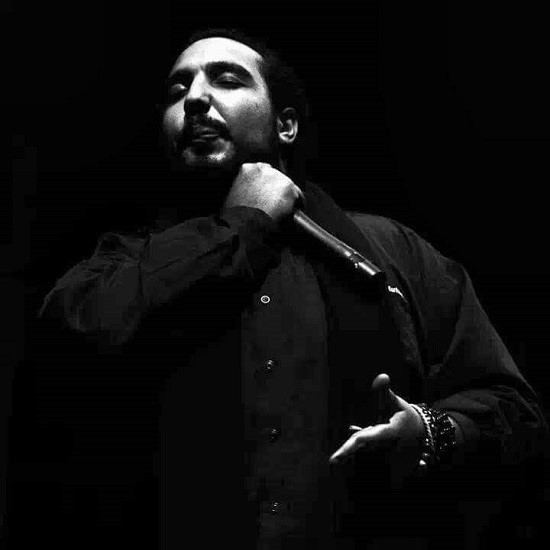Thaer the Beatbox Elephant may be one of the oldest in the
Amman’s hip-hop scene now, but he still remembers when
Tareq Abu Kweik first
gave him his nickname early in his career: “You are like an elephant, man. You
are calm, nobody expects you to be hype, but when you get onstage it is an
explosion.”
اضافة اعلان
Abu Kweik is better known now by his rap moniker “El Far3i”,
as well as for his work with famous bands El-Morabba3 and 47 Soul, but some 20
years ago, he and Thaer were two leading members of Jordan’s fledgling hip-hop
community, a small but passionate group of beatboxers, poppers, breakers,
rappers, DJs and graffiti artists.
 (Photo: handout from Thaer Fahmawi)
(Photo: handout from Thaer Fahmawi)
Thaer is one of the few people who remembers how it all
started in Amman, some two decades ago, and is still here to talk about it;
others moved, got married or lost interest, but he still performs in a variety
of genres, especially beatboxing, and also works as a promoter. He is one of
the few Jordanians who has managed to make a living as a hip-hop performer, and
is the official emcee for brands including Red Bull and Jameson whiskey in
Jordan.
True to his nickname, Thaer the Beatbox Elephant remembers
how it all started for him, as well as everything that has happened in the
Jordanian hip-hop scene since. He was already a precociously gifted child,
familiar with classic Arabic music like Fayrouz and Umm Kulthum thanks to his
mom’s influence, when his older cousin moved back to Jordan from the US and
changed his life with a Nokia Engage cell phone packed with music by Snoop
Dogg, Tupac, NWA, and other classic 90s rap.
 (Photo: handout from Thaer Fahmawi)
(Photo: handout from Thaer Fahmawi)
His cousin also brought back a DVD of a performance from the
now-legendary Up in Smoke tour, headlined by Snoop Dogg and Dr. Dre, and packed
with performances by rappers now considered among the most influential of all
time.
When asked if he remembers who was on it, Thaer responded
animatedly, as if he were 7 years old again, seeing the DVD for the first time,
bearing witness to something deeply exciting and clearly meant for an older
audience: “I saw it at a sleepover – there was Snoop Doggy Dog of course,
Eminem, Ice Cube, Nate Dogg – man come on, Nate Dogg!”
Soon after, he also discovered an artist not normally
associated with hip-hop: Michael Jackson. He loved the dancing so much that he
joined what was most likely Jordan’s first breakdancing crew, and then one day
at practice, while a dancer named Zuka was choreographing a dance to a Justin
Timberlake and Timbaland song, he noticed a musical style he had never heard
before – the dancers in the video were breaking it down to the rhythms of a
beatboxer, a musician who makes drum, bass and other sounds using only his
mouth.
Thaer was mesmerized, playing the beatboxing section on loop
for four hours straight, and when the other dancers came back from their lunch
break, he had learned to imitate the beatboxer from the video. From that day
on, he was beatboxing every day, working on his craft with a graffiti writer
named Aro who was also teaching himself to beatbox.
 (Photo: handout from Thaer Fahmawi)
(Photo: handout from Thaer Fahmawi)
At that point, a number of individuals who had independently
started to develop a passion for hip-hop started to coalesce into a crew. Thaer started to rattle off names: “Let’s
see, there was Dan Drill, Iraqi producer and rapper, and a guy named Amr
Al-Taher who rapped under the name Al-Mukhtar – he was originally Palestinian
but was born somewhere else. Our crew was dancing every day, and there were
these four or five rappers, and some producers, and me and Aro were
beatboxing.”
Dan Drill, Amr Al-Taher and MC Maze, he said, came up with the idea
that all these artists who were already coming together for variety-show style
performances to showcase all their different passions should form a unified
crew. That crew came to be called 962 Street, and as Thaer puts it, “we had all
the elements of hip-hop in one crew – we were the first hip-hop movement in
Jordan”.
The 962 Street hip-hop collective started performing at a
weekly Friday event called Suq Jara in Amman in 2008, and that is what really
sparked Jordan’s enduring beatbox scene. Thaer explained: “This homie Abood
Al-Adham was there helping his dad sell honey or something, and he asked to
learn how to beatbox – he started to learn from my partner Aro.”
Abood turned out to be extraordinarily passionate, and along
with Thaer, Aro, and a guy named Abdallah Masri who beatboxed alongside a
rapper named Bilal Shuli and a producer named Al-Basha, developed a scene of
about 16 beatboxers and held Jordan’s first beatboxing competition, called “The
Beastbox”, around 2010.
While most of the first 16 artists who competed in The Beastbox
do not perform any more, they laid the foundation for others to follow them,
and in 2014 Abood started the annual Jordanian beatboxing championship, “The
King of the Beat”. In 2018, Jordanian beatboxer Fahed Al-Huwayan, one of the
scene’s earliest competitors dating all the way back to Beastbox, became the
first Arab competitor in the international beatboxing championships.
Thaer was adamant about praising Abood for his efforts to
build and grow the community, stating: “Abood was going crazy with it, networking,
doing competitions – all on his own budget. I never said no to any event he put
on – I always showed up for the community.”
Nowadays, the scene has grown, and it has also changed.
Abood, Fahed, Aro, and many others have left the country, whether for work,
study, or marriage, but new names emerged. Thaer booked the first show in
Jordan for Syrian rapper Bu Kulthoum and Qatari beatbox champion Ahmad Abu-Zaid
at the Rainbow theater during their stint in Amman, and also spoke about
witnessing the rise of local acts like Illiam and The Synaptik, both
Palestinian rappers who made their names in Jordan before starting to achieve
more international success.
He says that nowadays the most active rapper in Amman is
Msallam, but that there are more beatboxers than anything else – he estimates
nearly 85 from Aqaba all the way to Mafraq, including a few women.
Thaer himself is now mainly a promoter, working with big
brands and also running his own events under his rapper name, “Rastafandy”, a
portmanteau of “Rastafarian” and “Afandi”, which is an Egyptian slang term
meaning “boss”. He is throwing a big New Year’s Eve party at the Prime Hotel in
Shmeisani, charging JD50 for an open bar dance party featuring DJ Buka, his old
DJ since the breakdancing days, saying: “If you see my name on an event, you
will see me beatboxing for sure.”
He calls himself one of the most complete hip-hop acts in
the Arab world, citing his ability to DJ, rap, dance, beatbox, and even sing in
classical Arabic style. In addition to all of that, he is also a historian,
holding the knowledge of how a cell phone full of Tupac tracks, a bootleg Snoop
Dogg DVD and the combined passion of a few free spirits gave rise to a hip-hop
community that has produced some of the best Arab rappers and beatboxers in the
world.
Read more Music







